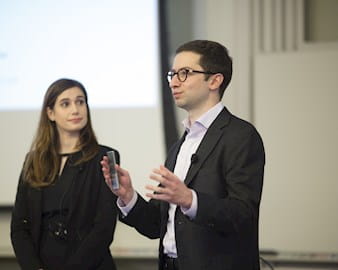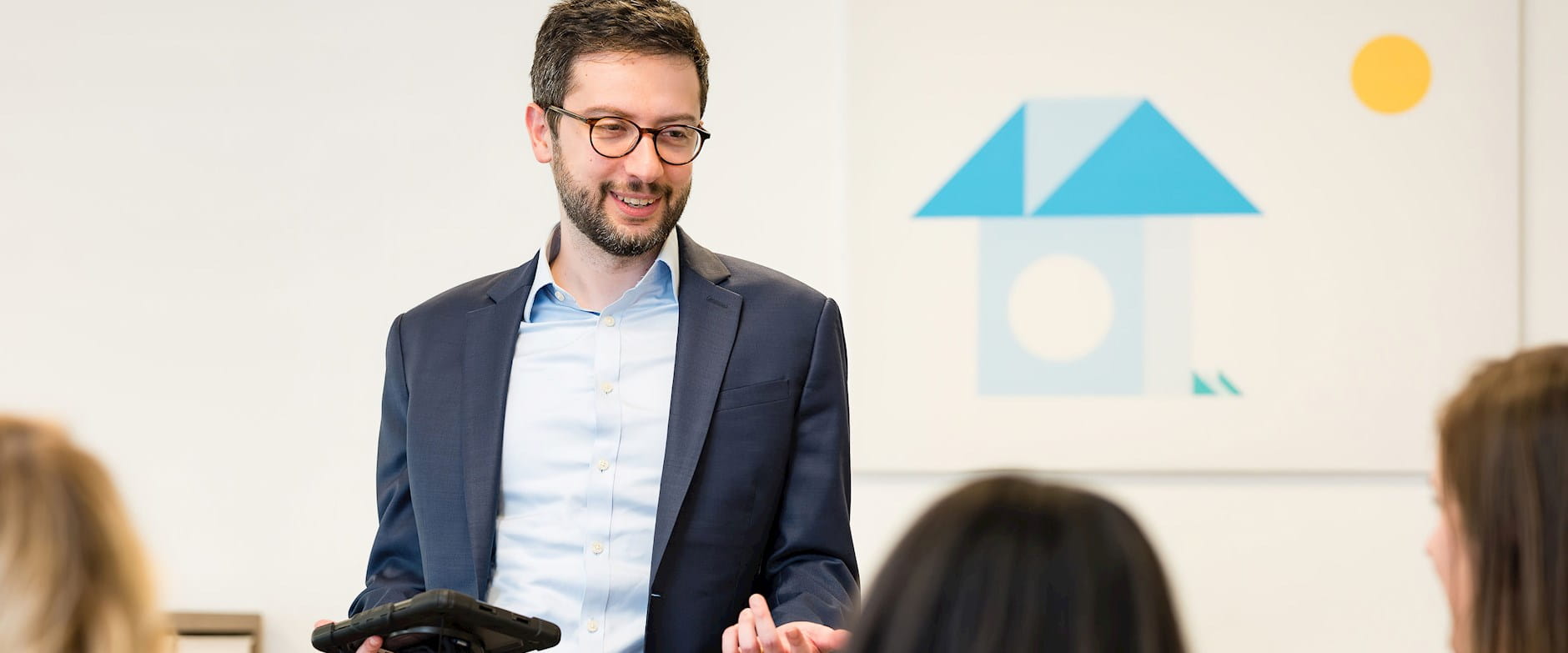While working in private equity, George Boghos saw two types of health care: profit-driven ventures that lacked quality care and clinician-backed organizations that put patients first but faced financial and business hurdles.
Boghos, ’18, channeled his passion for innovation and health care into starting Autism in Motion (AIM) Clinics, a University of Chicago-supported autism therapy social venture that provides Applied Behavior Analysis (ABA)—the gold standard in autism therapy—to more than 600 families across 26 clinics in Alabama, Arkansas, North Carolina, Oklahoma, and Tennessee.
This winter AIM Clinics is significantly expanding its impact, announcing plans to merge with Hopebridge, an organization that operates 74 clinics with a similar model and shared mission to provide ABA Therapy in underserved areas across the country. Combined with Hopebridge, the partnership will serve families at over 100 clinics across 12 states. Although the details of the merger were not disclosed, this is a significant milestone for AIM Clinics to accelerate and fuel future growth alongside partners at Hopebridge and its backing firm, Arsenal Capital.
The announcement marks the first such merger for any startup that has gone through the John Edwardson, ’72, Social New Venture Challenge (SNVC) at the University of Chicago Booth School of Business, which jump-starts nonprofit and for-profit ventures with a social mission. The SNVC is the social impact track of the university’s business launch competition, the New Venture Challenge, run by Chicago Booth’s Rustandy Center for Social Sector Innovation and the Polsky Center for Entrepreneurship and Innovation.
"Our growth and impact today has been shaped by the foundational support, investment, and mentorship I received from the Rustandy Center and Chicago Booth."
– George Boghos, ’18, AIM Clinics CEO

AIM Clinics won the SNVC in 2018, when Boghos cofounded the Arkansas-based company. Boghos, who served as CEO, will remain involved as president of the merged company.
“AIM Clinics’ journey began as a single small clinic in Arkansas when we took the company through the SNVC. At the time, central Arkansas had so few therapists that they could serve less than five percent of children with autism in their region," Boghos said. "Our growth and impact today has been shaped by the foundational support, investment, and mentorship I received from the Rustandy Center and Chicago Booth."
Boghos left private equity to tackle his interests in entrepreneurship and social impact as a student at Booth. Working alongside the talented AIM Clinics team, he tackled two looming social challenges—the fact that 1 in 54 children in the United States is diagnosed with autism spectrum disorder, according to the Centers for Disease Control and Prevention. And the realization that the only therapy for autism endorsed by the U.S. Surgeon General, Applied Behavior Analysis (ABA) therapy, was not widely available to families in many areas.
He founded AIM Clinics to bridge that gap.
In addition to offering therapy, AIM Clinics builds local pipelines of talented therapists through their AIM Fellowship that provides clinical experience, scholarships for master’s level coursework, and support toward the Board Certified Behavior Analyst (BCBA) credential. Hopebridge is also committed to clinical training across their clinic locations, the first of which opened in Indiana in 2005. Likewise, AIM Clinics will begin offering Occupational Therapy (OT) services and expanding its speech therapy offerings, in alignment with Hopebridge clinics.
“AIM Clinics’ achievements stand out for me because it’s a business that’s both sustainable and deeply committed to social impact. George is a true innovator in the field of health-care access, and is improving the lives of children with autism, their families, and the employees who serve them,” said Robert Gertner, the John Edwardson Faculty Director of the Rustandy Center and Joel F. Gemunder Professor of Strategy and Finance at Booth.
Building upon its success, earlier this year AIM Clinics was recognized as a Top 100 Finalist in the Chicago Innovation Awards.
Boghos credits his decision to apply to the SNVC as a critical turning point in his career. Without the intense focus, mentoring advice, and skills developed in the program, Boghos said he probably would have entered a more traditional post-MBA career.
Since 2011, the SNVC has launched more than 100 social ventures that have gone on to raise more than $45 million. Other notable alumni include solar-powered light company LuminAID, online voter guide BallotReady, Nairobi-based tractor leasing company Hello Tractor, Chicago-based nonprofit Debate it Forward, and the 2021 winner, SAEF Legal Aid.
Following AIM Clinics’ 2018 SNVC win, Boghos also earned the Rustandy Center’s Tarrson Social Venture Fellowship immediately after graduation, which awards funding and mentoring to graduating UChicago students who want to pursue their social ventures full time. Both offerings are part of the Edwardson Social Entrepreneurship Program, which drives the Rustandy Center’s work to become the leading university-based launchpad and knowledge center for game-changing social entrepreneurs, their ventures, and the people who fund them.
AIM Clinics’ merger has resulted in a realized equity investment for the Rustandy Center, which made early-stage investments in AIM Clinics through both the SNVC prize pool and the Tarrson Fellowship. These proceeds, along with a new philanthropic commitment from John Edwardson, ’72, will enable the Rustandy Center to increase the SNVC prize pool to at least $150,000 annually and to provide additional support for UChicago students and alumni as they launch and scale their social ventures.
“This expansion solidifies UChicago’s value in training the next generation of social entrepreneurs,” said Edwardson, retired chairman and CEO of CDW whose support helped launch the SNVC. “It’s an absolute thrill to see AIM Clinics drive and scale wide-ranging impact on a pressing social challenge affecting so many.”


